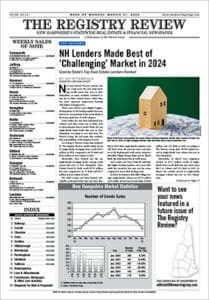
While the way customers use bank branches may change, they will still need a physical location to visit at key points in their relationship with their lender, senior bankers say.
Even with limited or no access to bank lobbies during the pandemic, bank leaders still expect branches to remain a key channel for customers.
The pandemic’s effect on the future of bank branches was among the topics discussed during a webinar with bank leaders hosted by the New England Council on June 4. Participating in the webinar were Eastern Bank CEO and Chair Bob Rivers; Dianne Mercier, president of People’s United Bank’s New Hampshire market; and Ed Hjerpe, president and CEO Federal Home Loan Bank of Boston. The webinar on “Leading in Crisis” was hosted by James Brett, the New England Council’s president and CEO.
The $58 billion-asset People’s United maintains 26 branches across Southern New Hampshire, from Chesterfield to Rye, while the $11.6 billion-asset Eastern maintains seven in Southeast New Hampshire, from Portsmouth to Nashua.
With much of Eastern Bank’s staff working from home during the pandemic, Rivers said the bank has put on hold plans to look for additional office space. But even with more customers using digital tools, Eastern has not taken any steps to reduce its branch footprint, Rivers said.
Mercier pointed out that a few decades ago people thought ATMs would lead to a reduction in branches, a prediction that didn’t pan out.
“I don’t think branches will go away; I think they will change,” Mercier said. “I think people will use them even less frequently than they did before, but they still need a place to go, and they still need our presence, and they need people to talk to.”
She added that the pandemic has accelerated the pace for businesses to adopt banking technology, as well as changed how businesses interact with their bankers.
Work-From-Home Popular
Both Mercier and Rivers see working from home as continuing for their banks. An internal survey showed that 82 percent of Eastern’s employees preferred to work two days from home, Rivers said. Mercier added that 95 percent of People’s United staff said they were as productive working from home, and 50 percent said they were more productive.
Rivers said one reason the sudden shift to working from home succeeded was the culture and strong relationships among colleagues that already existing within the bank. During the pandemic, communications with staff members have increased, including through virtual townhalls and weekly letters.
FHLBank Boston’s relationship managers typically travel across the six New England states to meet with financial institutions, Hjerpe said, and those meetings have been happening virtually, as have his own meetings, which used to have him frequently traveling across the country.
Hjerpe added that the organizational culture had been developed through in person, daily collaborations. Hjerpe and Rivers agreed that institutions will need to find ways to perpetuate, develop and sustain culture even as some staff continues to work from home.
Like most banks, Eastern and People’s United were active with the Paycheck Protection Program. Mercier said People’s United had processed 16,500 loans worth $2.6 billion across its markets. While it worked only with existing clients during the first round of funding, People’s United opened the second round to non-clients. She pointed out that funding is still available for businesses.
Eastern Bank has processed 8,000 loans worth $1.2 billion, and Rivers said banks still have two more chapters to work through with the PPP: managing the loan forgiveness process and then minimizing losses for banks.
Rivers said his top lesson from the pandemic has been a realization of the economy’s fragility.
“There is an enormous gap between those that have and those that have not, that’s just been put on steroids in this environment,” Rivers said.
He added the pandemic has especially revealed racial disparities and suffering within communities of color.
“This economy, while strong, is not built well to last, in my view, and I think we as a society and as business leaders need to have discussions about major investments that need to be made to really better support the many people who have been left behind in this economy,” Rivers said.

